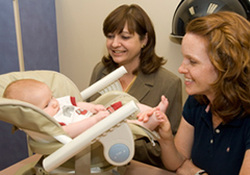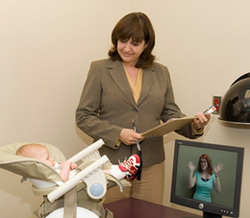
The Pediatric Development Research Laboratory (PDR) conducts research of interest to faculty and students that is focused on children′s development from birth to 18 years of age. It features a social interaction room to study interactions, such as those between family members (e.g., mother and infant), among peers and friends, and between adults and children. A separate infant testing laboratory is set up to study infant perception and memory of inter-modal stimuli (e.g., audio-visual events or visual-tactile objects). Observation booths allow for unobtrusive observation and recording of interactions and infant performance. The lab also has a physical and biochemical room for tracking children′s growth and for storing saliva cortisol samples. Coding booths are also available for students to score and code audio-visual data and for data analyses. Ongoing studies include prenatal and maternal depression effects on infant development, preschool children′s temperament and cortisol levels during social interactions, preschool children′s skin tone preferences, moral and language development.

